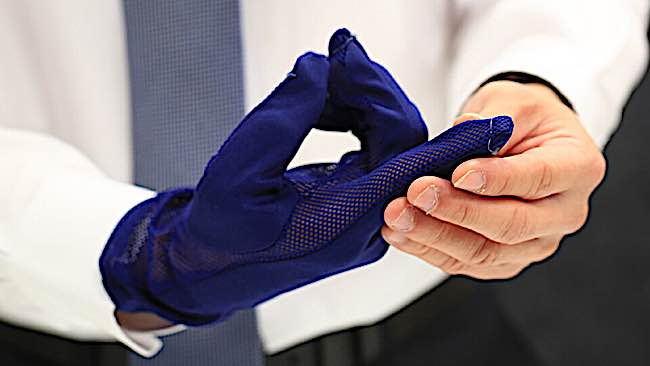A variety of wearable and flexible material used as pressure and stress sensors have been developed in recent years, though they are not without their limitations. Some of these include discomfort and poor fit. In an effort to solve these issues, a team of researchers from the National University of Singapore developed soft, ultra-thin microfibre sensors for real-time healthcare monitoring and diagnosis, and the results, according to lead researcher Professor Lim Chwee Teck, “are very promising.” The sensors may have applications outside of healthcare as well.
“Our novel microfibre sensor can hardly be felt on the skin and conforms extremely well to skin curvatures,” he said. “Despite being soft and tiny, the sensor is highly sensitive, and it also has excellent electrical conductivity and mechanical deformability. We have applied the sensor for real-time monitoring of pulse waveform and bandage pressure.”

The microfibre sensor comprises a liquid metallic alloy encapsulated within a silicone microtube. The sensor measures pulse waveform, providing information that can be used to determine a patient’s heart rate, blood pressure, and more. The sensors can also detect stiffness in blood vessels, which is common in patients suffering from atherosclerosis. In these patients, fatty streaks accumulate into plaques, blocking off blood flow and resulting in organ failure, heart attack, or stroke.
“Currently, doctors will monitor vital signs like heart rate and blood pressure when patients visit clinics,” said Teck. “This requires multiple equipment such as heart rate and blood pressure monitors, which are often bulky and may not provide instantaneous feedback. As our sensor functions like a conductive thread, it can be easily woven into a glove which can be worn by doctors to track vital signs of patients in real-time. This approach offers convenience and saves time for healthcare workers, while patients can enjoy greater comfort.”
The sensors are so thin and flexible that they are easily able to be woven into bandages to monitor the pressure that is delivered and maintained, thereby improving the treatment and reducing healing time.
Teck described the sensor as “highly versatile,” claiming that it “could potentially be used for a wide range of applications, including healthcare monitoring, smart medical prosthetic devices, and artificial skins. Uniquely designed to be durable and washable, our novel invention is highly attractive for promising applications in the emerging field of wearable electronics.”
The team recently won the Most Innovative award at the Engineering Medical Innovation Global Competition in Taipei. The team filed a patent and published their findings in two journals, Proceedings of the National Academy of Sciences and Advanced Materials Technologies. Meanwhile, researchers continue to work toward improving the sensor’s design and make it more user-friendly.


































